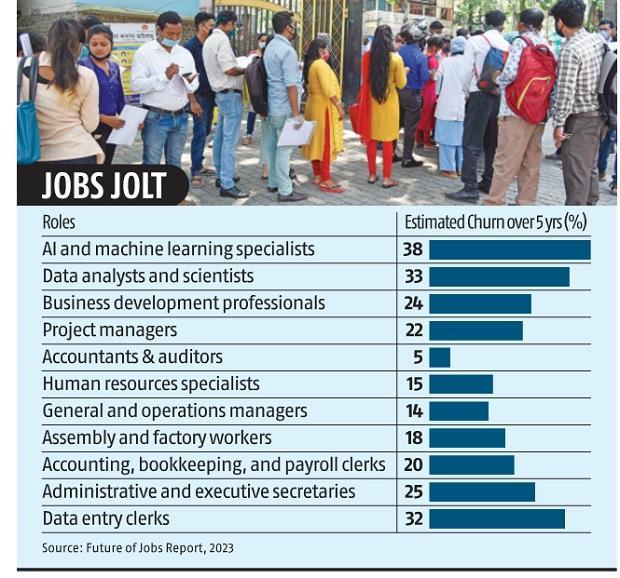India’s Job Market Expected to Witness 22% Churn over Next 5 Years:
A new study by the World Economic Forum (WEF) suggests that the Indian job market is expected to witness a 22% churn over the next five years, with top emerging roles coming from AI, machine learning, and data segments. Globally, the job market churn is estimated at 23%, with 69 million new jobs expected to be created and 83 million eliminated by 2027.
Buy Prime Test Series for all Banking, SSC, Insurance & other exams

Employers Anticipate 69 Million New Jobs to Be Created and 83 Million Eliminated Globally:
According to the estimates of the 803 companies surveyed for the report, employers anticipate 69 million new jobs to be created and 83 million eliminated among the 673 million jobs corresponding to the dataset, a net decrease of 14 million jobs or 2% of current employment.
ESG Standards, Adoption of New Technologies, and Broadening Digital Access Drive Job Growth:
The report found that in India, 61% of companies think broader applications of ESG (environment, social and governance) standards will drive job growth, followed by increased adoption of new technologies (59%) and broadening digital access (55%). Top roles for industry transformation in India would be AI and machine learning specialists, and data analysts and scientists.
Manufacturing and Oil and Gas Sectors Have the Highest Level of Green Skill Intensity Globally:
The report also found that manufacturing and oil and gas sectors have the highest level of green skill intensity globally, with India, the US and Finland featuring at the top of the list for the oil and gas sector.
Macro Trends Driving Job Growth:
The WEF said that macro trends, including the green transition, ESG standards and localisation of supply chains are the leading drivers of job growth globally, with economic challenges, including high inflation, slower economic growth and supply shortages, posing the greatest threat. Advancing technology adoption and increasing digitisation will cause significant labour market churn, with an overall net positive in job creation, it added.
The Future of Jobs Report: Challenges and Opportunities:
The WEF’s Future of Jobs report found that technology continues to pose both challenges and opportunities to labour markets, but employers expect most technologies to contribute positively to job creation. Big data ranks at the top among technologies seen to create jobs. The employment of data analysts and scientists, big data specialists, AI machine learning specialists and cybersecurity professionals is expected to grow on average by 30% by 2027.
Education and Agriculture Sectors to See Significant Job Growth:
The report also found that the largest absolute gains in jobs will come from education and agriculture. Jobs in the education industry are expected to grow by about 10%, leading to 3 million additional jobs for vocational education teachers and university and higher education teachers. Jobs for agricultural professionals, especially agricultural equipment operators, graders and sorters, are expected to see a 15-30% increase, leading to an additional 4 million jobs.
Training Opportunities for Workers:
Globally, six in ten workers will require training before 2027, but only half of the employees are seen to have access to adequate training opportunities today. At the same time, the report estimates that, on average, 44% of an individual worker’s skills will need to be updated.
Also Read: Freedom House Index: Tibet ranked the world’s least free country
Find More Ranks and Reports Here



 Indian Olympic Medal Winners List Till N...
Indian Olympic Medal Winners List Till N...
 Who is the Inventor of the Gramophone?
Who is the Inventor of the Gramophone?
 HS Dhaliwal Appointed New DGP Of Andaman...
HS Dhaliwal Appointed New DGP Of Andaman...
